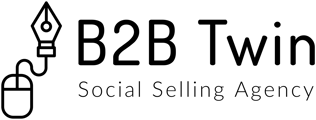How to overcome B2B social selling barriers
Prioritizing education, collaboration, and adaptability will unlock social selling’s full potential for driving growth and success.
SOCIAL SELLINGSALESB2BSTORYTELLINGSOCIAL MEDIA


Are you tired of hitting a roadblock whenever you try to sell your B2B products or services through social media? You’re not alone, and don’t despair! This article guides you through these challenges and provides actionable tips on overcoming them.
Understanding the importance of social selling
Social selling has become essential for businesses to thrive in today’s digital landscape. It goes beyond traditional sales tactics and focuses on building genuine relationships with prospects and customers. The actual power of social selling lies in its ability to tap into the immense potential of social media platforms. These platforms allow businesses to find new leads, nurture relationships, and drive conversions.
One thing that sets social selling apart from traditional methods is its emphasis on personalized interactions. Unlike cold calls or mass emails, social selling allows sales professionals to connect with prospects more personally by engaging in meaningful conversations, sharing relevant content, and providing value-driven insights. By doing so, companies can establish themselves as trusted advisors and industry experts, which helps get new customers and fosters long-term loyalty.
An often overlooked benefit of social selling is its ability to gather valuable customer insights. Businesses can understand customer preferences, pain points, and motivations by monitoring engagement metrics, feedback from comments or direct messages, and sentiment analysis tools. These insights can be translated into data-driven marketing strategies tailored to meet the target clientele’s needs, further enhancing customer satisfaction and retention rates.
Identifying common barriers in B2B social selling
Social selling has become essential for B2B companies to connect with their target audience and drive sales. However, like any other marketing tactic, it has its fair share of barriers that can hinder success. One common barrier is a need for more understanding about the platform and how to navigate it effectively. B2B sellers may need to pay more attention to the importance of crafting a strong online presence and need to use social media channels such as LinkedIn or Twitter.
Another significant barrier to B2B social selling is the resistance from potential customers overwhelmed by the influx of messages from sellers. With more businesses adopting social selling strategies, it’s becoming challenging for sales professionals to stand out in the crowded digital space. Decision-makers often perceive outreach attempts as intrusive and impersonal, leading to low response rates. Building trust and establishing a genuine connection should be prioritized over pushing product or service pitches to overcome this hurdle.
While these barriers may pose challenges for B2B social selling, they are manageable. By dedicating time and effort toward building an online presence, understanding customer needs and pain points, and focusing on relationship-building rather than constant promotion, businesses can overcome these hurdles and make meaningful connections with prospects in today’s digital landscape.
Building a strong online presence
With more and more professionals using social media platforms and online resources to research potential partners, it’s vital to have a strategic approach to your online presence that sets you apart from the competition.
Creating an engaging and informative website is crucial to building a solid online presence. Your website should be the hub of your online activities, providing prospective clients with valuable content such as blog posts, case studies, and whitepapers. By offering valuable insights into your industry and showcasing your expertise, you can establish credibility and attract potential clients looking for solutions to their problems.
Another aspect of developing an online presence is leveraging social media platforms. While many businesses have a presence on social media channels, only some take full advantage of its potential for B2B social selling. Rather than broadcasting promotional messages, focus on building relationships with your target audience by sharing relevant content, participating in industry discussions, and engaging with potential clients. This personal touch can help differentiate your brand from competitors and position you as a trusted advisor in your industry.
Establishing trust and credibility
By being honest about your product or service’s strengths and limitations, you commit to helping potential clients make informed decisions. Sharing case studies, testimonials, and success stories from satisfied customers can help establish credibility by showcasing real-world results.
Another effective way to build trust is by providing valuable content that educates and solves problems for your target audience. You position yourself as an authority in your field by delivering valuable insights, tips, and industry knowledge through blog posts, videos, or webinars. This helps cultivate trust as potential clients perceive you as knowledgeable and dedicated to their success.
Lastly, engaging with your audience on social media platforms can also contribute to establishing trust. Respond to comments or questions from prospects or existing clients while demonstrating empathy and understanding. This shows you value their opinions and concerns, building rapport and credibility.
By focusing on establishing trust through transparent communication practices, providing valuable content, and engaging with audiences on social media platforms, you can overcome B2B social selling barriers. Building trust takes time, but investing in these strategies will pay off in long-term relationships with customers who see you as a trusted partner rather than another salesperson.
Leveraging social media platforms
Social media platforms have revolutionized how businesses connect and engage with their customers. But leveraging these platforms comes with its fair share of challenges.
While taking shortcuts or automating your posts may tempt you, this can backfire and alienate your audience. Instead, focus on creating valuable content that resonates with your target audience. Provide insights, answer questions, and share thought-provoking articles or videos about your industry.
Besides authenticity, another challenge is keeping up with ever-changing algorithms and trends across social media platforms. Each platform has its unique set of rules for success, which require monitoring analytics, experimenting with various strategies, and adjusting. By staying on top of these changes and embracing innovation in your social media efforts, you can leverage these platforms to drive engagement, build brand awareness, and grow your business in the B2B space.
Developing a personalized approach to engagement
A way to personalize engagement is by leveraging data and analytics. By analyzing the behaviors and preferences of prospects, social sellers can gain valuable insights that allow them to deliver more relevant content and messages. This increases the chances of catching potential clients’ attention and shows a high level of understanding, which can build trust and credibility.
Another aspect of personalized engagement involves listening to your audience. Social media platforms provide abundant information about what people say, share, and discuss. By monitoring these conversations, B2B social sellers can pick up on pain points or challenges affecting their target audience. This knowledge can then craft tailored solutions or address specific concerns in their engagements.
The key takeaway is that developing a personalized approach requires effort but is not impossible. By leveraging data and analytics while listening to your audience, you will be well on your way to overcoming barriers in B2B social selling and forging genuine connections with potential clients.
Overcoming barriers to successful B2B social selling
While navigating through the challenges of limited understanding and lack of resources can be daunting, businesses must stay committed to adapting and embracing new strategies.
One factor in overcoming these barriers is investing time and effort into educating sales teams on the power of social selling. By providing comprehensive training and continuous learning opportunities, organizations can equip their teams with the knowledge and skills to use social media platforms for successful lead generation.
Fostering a culture of collaboration within the company can contribute to overcoming barriers in B2B social selling. Encouraging sales teams to work with marketing departments, using technology tools for seamless communication, and leveraging shared insights can all lead to enhanced collaboration and more effective social selling efforts.
By prioritizing education, collaboration, and adaptability, businesses can overcome barriers in B2B social selling and unlock their full potential as a powerful tool for driving growth and success.
Education plays a crucial role in overcoming barriers in B2B social selling. Sales teams must have the knowledge and skills to navigate the digital landscape and leverage social media platforms for lead generation. This can be achieved through targeted training programs and ongoing professional development opportunities focused on social selling strategies, content creation, and effective communication techniques.
